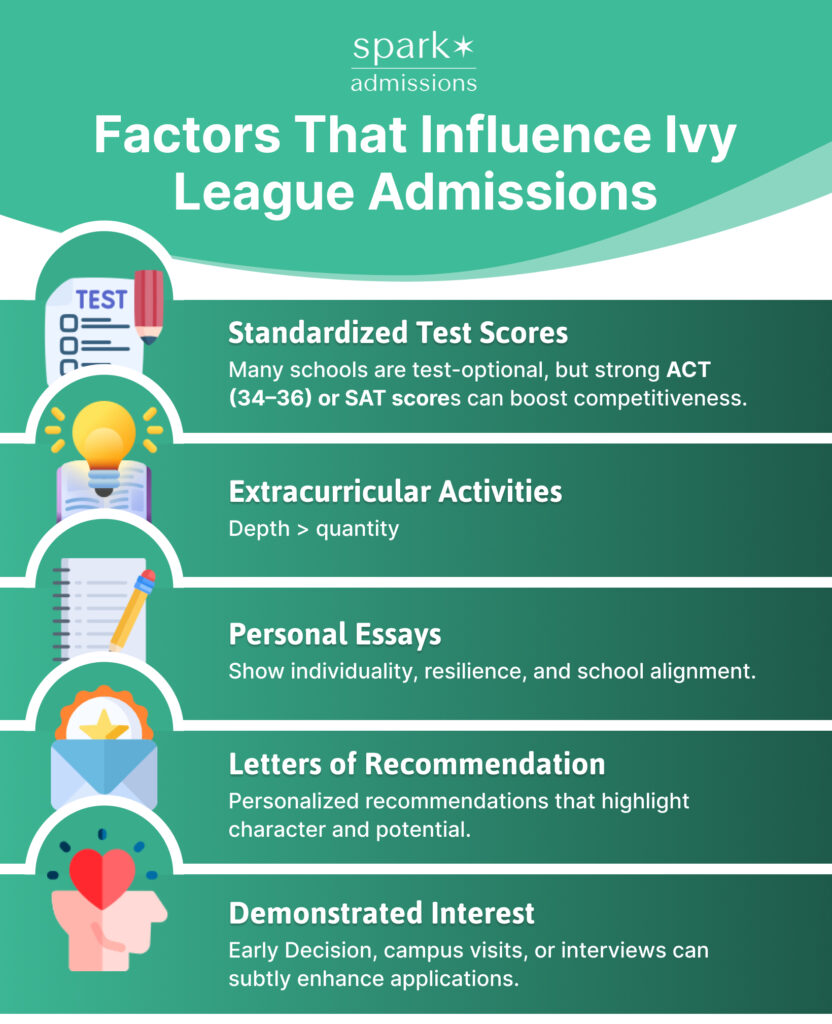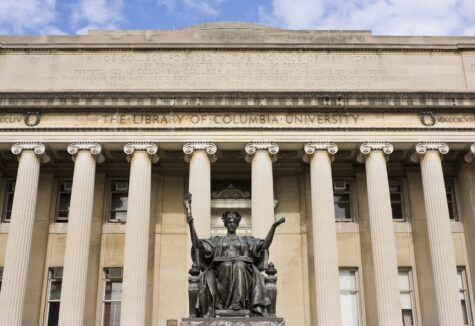- Blog
- > Ivy League Admissions
Which Is the Easiest Ivy League School to Get Into?
- Dr. Rachel Rubin
- | December 19, 2024

The Ivy League is synonymous with academic excellence, exclusivity, and prestige. Comprising eight elite institutions, Ivy League schools have a reputation for incredibly low acceptance rates and rigorous admissions standards. However, even within the Ivy League, schools vary in their selectivity.
Understanding which Ivy might be the “easiest” to get into involves more than just looking at acceptance rates. It requires an analysis of factors like admissions criteria, specific program requirements, and strategic application planning.
The Ivy League at a Glance
Before diving into which is the easiest Ivy to get into, it’s essential to understand the similarities and differences among these schools. The Ivy League includes:
- Brown University
- Columbia University
- Cornell University
- Dartmouth College
- Harvard University
- University of Pennsylvania
- Princeton University
- Yale University
Each Ivy League school offers a distinct campus culture, academic strengths, and admissions priorities, which means the “easiest” school for one applicant may not be the same for another.
Easiest Ivy League Schools vs. Hardest Ivy League Schools
The Ivy League schools are often viewed as a monolith of exclusivity, but their acceptance rates and admissions criteria reveal a spectrum of difficulty. Understanding which are considered “easier” or “harder” Ivy League schools to get into can help applicants align their strengths and goals with their applications.
The Easiest Ivy League Schools
Get out your list of undergraduate colleges, and Ivy Leagues may be at the top. They all have varying qualifications when it comes to test scores, diverse academic interests, international students, and extracurricular activities. So, you may wonder, which is the most accessible Ivy League school?
Cornell University
Some consider Cornell one of the easiest Ivy League schools to get into, and this is why.
Acceptance Rate: Approximately 9% (Class of 2027)
Why It’s Easier:
Among the eight Ivies, Cornell is often considered the most accessible based on its slightly higher acceptance rates. For the Class of 2027, Cornell had an acceptance rate of approximately 9%, higher than the rates at schools like Harvard (3.4%) and Columbia (3.9%).
Cornell’s higher acceptance rate is partly because it houses multiple colleges within the university, each with its own admissions criteria and selectivity for prospective students. For example:
- The College of Agriculture and Life Sciences may have standards different from those of the College of Arts and Sciences.
- Specialized programs like the School of Hotel Administration cater to specific career paths, attracting a niche pool of applicants.
While Cornell’s acceptance rate is higher than its peers, it’s still incredibly competitive among prestigious schools. Applicants to Cornell must, therefore demonstrate strong academic records, meaningful extracurricular involvement, and a compelling personal narrative.
Dartmouth College
Dartmouth follows specific Ivy League institution guidelines for acceptance.
Acceptance Rate: Around 6–7% in recent years
Why It’s Easier:
Dartmouth emphasizes leadership and community engagement, which can provide an edge for Ivy League applicants with a strong record of extracurricular involvement or civic participation. Its smaller, tight-knit campus appeals to a specific subset of applicants, making it less universally competitive than some of its peers.
University of Pennsylvania (Penn)
Of all Ivy League institutions, Penn sets itself apart.
Acceptance Rate: 5–6% for recent classes
Why It’s Easier:
Penn’s pre-professional focus, particularly through the Wharton School of Business, offers clear pathways for applicants with demonstrated career goals in business, healthcare, or other professional fields. Applicants with strong academic preparation in these areas can align themselves well with Penn’s mission.
The Hardest Ivy League Schools
While it’s challenging to pinpoint the hardest Ivy League school, we can create a list based on acceptance rate percentages and other factors.
Harvard University
The hardest Ivy League is Harvard, according to college admissions statistics.
Acceptance Rate: 3.4% (Class of 2027)
Why It’s Harder:
Harvard receives a massive number of applications from top-tier students worldwide. Its emphasis on leadership, innovation, and academic excellence makes the bar exceptionally high for all applicants.
Columbia University
Students aspiring to attend Columbia want access to one of the nation’s most elite universities.
Acceptance Rate: 3.9% (Class of 2027)
Why It’s Harder:
Located in the heart of New York City, Columbia attracts students who thrive in urban environments and competitive settings. Its rigorous Core Curriculum requires applicants to demonstrate a passion for a broad and challenging liberal arts education. Learn how to get into Columbus University.
Princeton University
As one of the hardest Ivy League schools, Princeton prepares students for higher education.
Acceptance Rate: 4.4% (Class of 2027)
Why It’s Harder:
Princeton’s strong focus on undergraduate education and its emphasis on research make it particularly appealing to academically driven students. The university’s financial aid generosity also draws a vast number of high-achieving applicants.
Yale University
As a highly sought-after Ivy League school to get into, Yale is extremely selective.
Acceptance Rate: 4.5% (Class of 2027)
Why It’s Harder:
Yale’s emphasis on creative and intellectual leadership often attracts applicants with unique and accomplished profiles. Its residential college system and strong humanities programs make it a favorite for students interested in a comprehensive liberal arts education.
Maintaining a Sensible Perspective
While some Ivy League schools may have marginally higher acceptance rates, all eight institutions maintain rigorous standards. Schools like Cornell and Dartmouth offer specific advantages for applicants with niche interests or strong leadership profiles. On the other hand, Harvard, Princeton, and Columbia maintain extraordinarily low acceptance rates and require applicants to excel in nearly every aspect of the admissions process.
Applicants should focus on fit, including academic interests, campus culture, and long-term goals, rather than solely on perceived ease of admission. Each Ivy League school offers unique opportunities for the right candidate.
Why Acceptance Rates Can Be Misleading
Although Cornell may have the highest acceptance rate in the Ivy League, this doesn’t mean it’s “easy” to gain admission. Selectivity varies based on several factors:
- Applicant Pool: The quality of applicants is consistently high across all Ivy League schools, meaning even a school with a higher acceptance rate still has incredibly competitive standards.
- Program-Specific Selectivity: Programs like Cornell’s architecture or engineering schools can be as selective as Harvard or Princeton.
- Demographics and Diversity Goals: Admissions offices aim to build diverse and balanced classes of accepted students, which can influence the chances of individual applicants.
The Role of Fit in Ivy League Admissions
When applying to Ivy League schools, choosing the easiest Ivy League school to get into should involve more than just focusing on acceptance rates. While schools like Cornell and Dartmouth may statistically offer a higher chance of admission, it’s crucial to evaluate other factors to ensure the best personal and academic fit.
Academic Programs and Career Opportunities
Each Ivy League school has distinctive academic strengths. For instance:
- Cornell offers specialized programs like engineering, agriculture, and hotel administration, making it a great fit for students with these career interests.
- Princeton, known for its focus on undergraduate research and small class sizes to prepare students for graduate school, appeals to students passionate about hands-on learning.
- Harvard students seek an expansive alumni network and interdisciplinary opportunities.
Evaluating how a school’s programs align with your career goals can help you identify which Ivy fits your aspirations, regardless of its ease of admission.
Campus Culture and Community
The campus culture of each Ivy League school varies significantly:
- Dartmouth College is renowned for its close-knit community and focus on outdoor activities.
- Columbia University, situated in New York City, attracts students who thrive in vibrant, urban environments.
- Yale University offers a strong emphasis on the arts and humanities, creating a creative and collaborative atmosphere.
Understanding how a school’s culture aligns with your personality can lead to greater personal fulfillment during your college years.
Location and Size
Ivy League schools range from rural campuses like Cornell and Dartmouth to urban environments like Columbia and Penn.
- Consider whether you prefer a large campus with sprawling facilities or a smaller, more intimate setting.
- Geography also matters—students who enjoy city life might thrive at Columbia, while those seeking a quieter environment may prefer Dartmouth.
These considerations impact not only your day-to-day experience but also your ability to access internships and extracurricular opportunities.
Financial Aid Policies
Ivy League schools are known for their generous financial aid packages, but policies can vary:
- Princeton and Harvard often top rankings for financial aid generosity, offering need-blind admissions and meeting 100% of demonstrated need without loans.
- If affordability is a primary concern, researching these policies can help determine which school is the most accessible for you.
Fit Matters More Than Ease
Choosing the “easiest” Ivy League school based solely on acceptance rates may lead to mismatches in academic goals, campus life, or career opportunities. Finding the right fit ensures not only a better chance of admission but also a more enriching college experience. When your chosen school aligns with your strengths and values, you’re more likely to excel academically, engage socially, and make the most of the Ivy League experience.
In short, understanding where you belong can transform getting into a prestigious university from a daunting challenge into an attainable and rewarding opportunity.

Factors That Influence Admissions
The Ivy League’s holistic admissions process means that acceptance rates are only part of the equation. Here are additional factors that play a role:
- Standardized Test Scores
While a few Ivy League schools have adopted test-optional policies, submitting strong ACT or SAT test scores can still enhance an application. Competitive applicants typically have ACT scores in the range of 34–36. - Extracurricular Activities
The depth of involvement often matters more than the number of activities. Leadership roles, significant achievements, and unique passions stand out to admissions committees of selective schools. - Personal Essays
Essays provide an opportunity to showcase individuality, resilience, and alignment with the school’s values. Tailored essays that connect personal experiences to the university’s mission are particularly effective. - Letters of Recommendation
Strong, personalized recommendations from teachers or mentors can highlight an applicant’s character and academic potential. - Demonstrated Interest
While not as critical for Ivy League schools as for some other institutions, showing genuine interest through campus visits, interviews, or Early Decision applications can make a difference.
Strategies to Improve Your Chances
If you’re aiming to increase your odds of getting into an Ivy League school, consider these strategies:
Apply Early Decision
Early Decision applicants often have higher acceptance rates because they demonstrate a strong commitment to the school. For instance, Cornell’s Early Decision acceptance rate is typically higher than its Regular Decision rate.
Tailor Your Application
Research each school’s mission and values, and ensure your application reflects a genuine fit. For example, if applying to Dartmouth, emphasize community engagement and leadership.
Strengthen Your Academic Profile
Take challenging courses, maintain a high GPA, and excel in standardized tests if you choose to submit them. Rigorous coursework in high school signals readiness for college-level academics.
Leverage Unique Strengths
Whether it’s a groundbreaking research project, an entrepreneurial venture, or a leadership initiative, highlight what sets you apart from other applicants.
Partner With a College Admissions Consultant
An Ivy League admissions consultant can help guide you through the admissions process, prepare you for interviews, and create an action plan to increase your chances.
Seek the Ivy League Education of Your Dreams
While Cornell University may have the highest acceptance rate among Ivy League schools, gaining admission to any Ivy remains a monumental achievement. Each school has unique strengths and admissions priorities, so the “easiest” Ivy depends on an applicant’s individual profile and goals. Remember, the best Ivy for you is the one that aligns most closely with your aspirations and potential.
At Spark Admissions, we work to find the Ivy League university that speaks to your strengths. Discover a campus community where you can thrive and build the foundation for your future. Let us guide you through the admissions process, helping you understand what the admissions committee values most. Together, we’ll make your college aspirations a reality.


